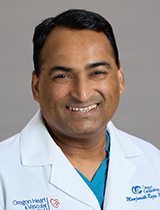Heart failure signs to watch for and questions to ask your provider

Learn how your body may hide signs of heart failure.
Bodies are incredible. You may be experiencing heart failure and not know it because your body will make up for it by doing other things.
Heart failure happens when the heart muscle isn’t able to pump enough blood to circulate in your body.
What causes it?
It’s often caused by a different medical condition that damages the heart in some way. This could be from high blood pressure, coronary heart disease, irregular heartbeat, alcohol, heart attack, thyroid disease and sometimes unknown causes.
Oftentimes, the symptoms are slow to develop, and people don’t notice until it starts affecting the heart pump.
“Congestive heart failure is a leading cause of hospitalization in adults." said Manjunath Raju, MD, FACC, FSCAI, FSVM, PeaceHealth Oregon Medical Director for the Vascular & Endovascular program.
How your body may hide it
Your body may hold on to salt and water because your heart cannot pump as well as it should. This increases the amount of fluid circulating in your body.
If your body isn’t able to keep up, then that’s when congestive heart failure signs may appear. This occurs when fluid starts to appear in your lungs, your belly feels bloated or you have swelling in the ankles and feet.
How to know if you have heart failure
If you have one or a combination of these symptoms, make an appointment with your doctor to talk about the possibility of heart failure.
- Swelling in your feet, ankles, legs or midsection.
- Shortness of breath if normal activities are harder to do or if breathing is interrupted by coughing or wheezing.
- Being unable to sleep or breathe well while lying down.
- Feeling lightheaded or fainting.
- Rapid heart rate, nausea or no appetite.
- Quick weight gain or loss.
- Chest pain when you are physically active.
Your doctor will also perform a physical exam and do an echocardiogram, using an ultrasound device to examine your heart. This will confirm if heart failure is happening. It also allows them to work with you to make the right treatment plan.
How is heart failure treated?
It’s often treated with a combination of medicine and lifestyle changes. “It may also include more advanced approaches like coronary angioplasty/stents or a heart device like a pacemaker,” said Dr. Raju.
Your doctor may recommend reducing the amount of salt and liquids you drink in order to manage the fluid in your body.
Some medications should be avoided because they could make heart failure worse.
- Nonsteroidal anti-inflammatory drugs (NSAIDs): These include painkillers like ibuprofen (Advil or Motrin) which may cause your body to hold onto fluids and salt.
- Some over-the-counter medicines. These include cold remedies with pseudoephedrine (Sudafed) or phenylephrine (Suphedrine PE). This type of medicine also causes your body to retain fluids and salt.
- Herbal medicines. Common options like St. John’s wort, ginseng and green tea may react with several common heart medications.
Treating heart failure can slow its progress and help you feel better. Treatment may also help you live longer. “We tend to waste so much of our time in doing unwanted things; just spare a few moments for the well-being of your heart!” said Dr. Raju.






